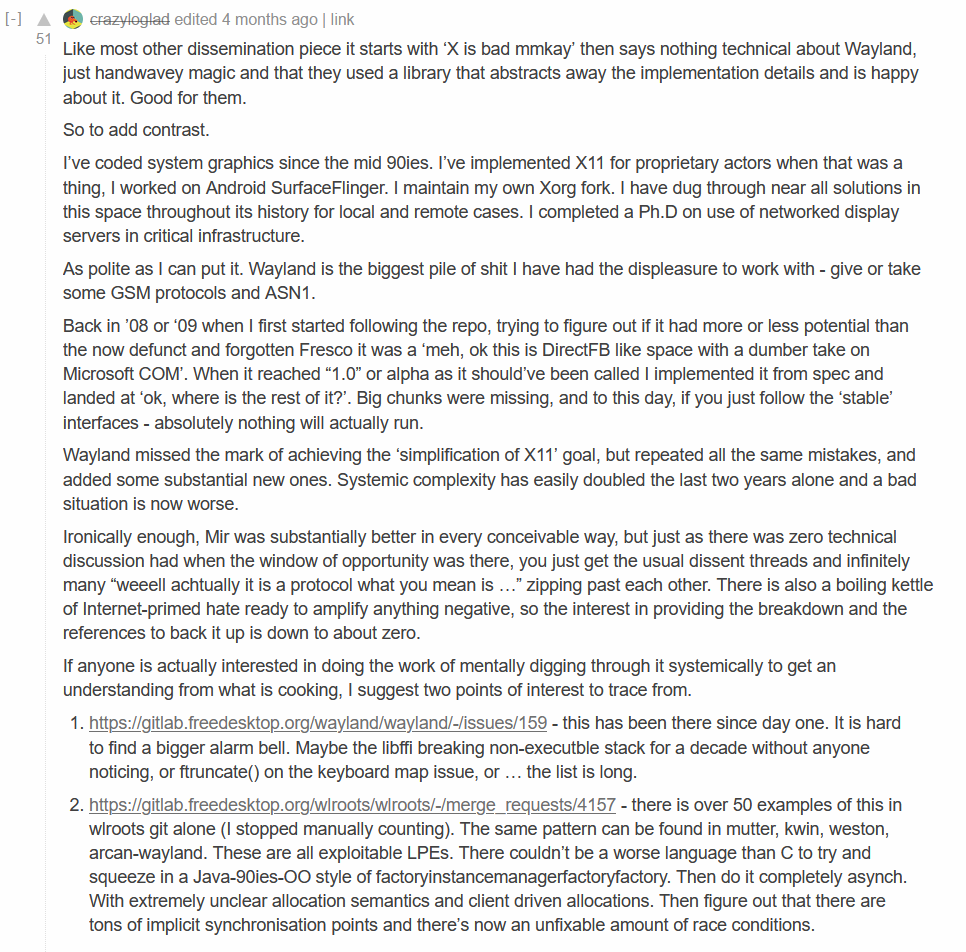this post was submitted on 02 Jan 2024
162 points (81.4% liked)
Linux
54907 readers
420 users here now
From Wikipedia, the free encyclopedia
Linux is a family of open source Unix-like operating systems based on the Linux kernel, an operating system kernel first released on September 17, 1991 by Linus Torvalds. Linux is typically packaged in a Linux distribution (or distro for short).
Distributions include the Linux kernel and supporting system software and libraries, many of which are provided by the GNU Project. Many Linux distributions use the word "Linux" in their name, but the Free Software Foundation uses the name GNU/Linux to emphasize the importance of GNU software, causing some controversy.
Rules
- Posts must be relevant to operating systems running the Linux kernel. GNU/Linux or otherwise.
- No misinformation
- No NSFW content
- No hate speech, bigotry, etc
Related Communities
Community icon by Alpár-Etele Méder, licensed under CC BY 3.0
founded 6 years ago
MODERATORS
you are viewing a single comment's thread
view the rest of the comments
view the rest of the comments

I'm going to post this thread anytime I get some random screaming about how Linux is soooo much easier than Windows.
On a more serious note, Wayland is a dumpster fire, and has been for many years now. I have up after spending a few hours dicking around in xdotool trying to get mouse gestures to work only to find out I should have been using the new ydotool...
Fuck all of that. Linux desktop really could use a benevolent dictator that has some vision and understanding what the average user wants.
This bullshit is the number 1 detractor of adoption.
How is that relevant at all to the UX of Linux Desktop vs Windows? Windows doesn't even have mouse gestures.
It has that really shitty one where you wiggle your mouse to figure out where the cursor is and all your windows disappear.
There may be others.
It already has these. They're called Linux Distros. They decide the combination of packages that make up the end to end experience. And they're all aimed at different types of user.
Why are none explicitly aimed at the average Windows user? I suspect there's one major reason. The average Windows user is incapable of installing an operating system at all, and new PCs invariably come with Windows pre-installed. This isn't a sleight on them by the way, it's just that most computer users don't want or need to know how anything works. They just want to turn it on, and post some crap on Twitter/X then watch cat videos. They don't have an interest in learning how to install another operating system.
Also, a distro aimed at an average Windows user would need to be locked down hard. No choice of window manager, no choice of X11/Wayland. No ability to install applications not in the distro's carefully curated repository, plus MAYBE independently installed flatpak/other pre-packaged things. The risk of allowing otherwise creates a real risk of the system breaking on the next big upgrade. I don't think most existing Linux users would want to use such a limiting distro.
Unless Microsoft really cross a line to the extent that normal users actually don't want anything to do with windows, I cannot imagine things changing too much.
Your entire paragraph is correct in most ways and really games the issues when Linux desktop in a nutshell. None of that will work for the average user.
My point was, the next time I see someone scream just use Linux, it's easy, I will post this.
It's not easy, and it's somewhat baked in due to the design goals. IMO it would be better if that were accepted instead of bashing windows and osx. I realize I'm off topic by the end there but I felt the need to elaborate.
Man, I sure do love using Wayland without issues.
What a ridiculous straw man. I don't think I've ever heard anybody promote Linux but claiming that it's easier than Windows.
That's a trend I've noticed from Linux critics: they had some bad experience due to a use case that they didn't feel was properly catered to, and because they had a bad experience, that's the reason why more people aren't choosing Linux.
I've never used mouse gestures. I'm willing to bet most users don't. People aren't picking up Linux and going "Aaarrrgghhh! This sucks, because I can't program my mouse gestures!" This sounds like a power user feature. Catering to power users so that they don't badmouth you online is not a good UX design strategy.
The fact that you don't think people use gestures is enough for me to believe you don't have interactions with normal users. People love their touch pads.